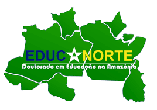Banca de DEFESA: GILSON PEDROSO DOS SANTOS
Uma banca de DEFESA de DOUTORADO foi cadastrada pelo programa.STUDENT : GILSON PEDROSO DOS SANTOS
DATE: 25/03/2024
TIME: 15:00
LOCAL: Meio virtual
TITLE:
DIGITAL TECHNOLOGIES AND COMPUTATIONAL THINKING AS THEORETICAL-PRACTICAL SUPPORT IN INITIAL TEACHER TRAINING
KEY WORDS:
Digital Technologies; Computational Thinking; Teacher Training; Education in the Amazon.
PAGES: 250
BIG AREA: Ciências Humanas
AREA: Educação
SUBÁREA: Ensino-Aprendizagem
SPECIALTY: Métodos e Técnicas de Ensino
SUMMARY:
Technologies occupy more and more spaces in modern life, transforming human relationships in education, work, communication, among other aspects. Therefore, it is important to discuss the role of these artifacts in society and how they should be used, especially considering the educational challenges of the Amazon. Thus, this work aims to investigate how Digital Technologies (DT) and Computational Thinking (CP) can be articulated as a theoretical-practical support for Initial Teacher Training in the Amazonian context. To this end, the studies were based on theorists such as: Freitas (2008, 2010) on Digital Technologies; Wing (2006, 2009), Blikstein (2008) and Brackmann (2017) regarding Computational Thinking; Teacher Training in the view of Gatti (2016) and Nóvoa (1992); Teles (2017) and Silva and Mascarenhas (2018) about Education in the Amazon, among others. This is qualitative, exploratory research, in which two training courses are proposed, CF1 and CF2. CF1, developed in a class on the Degree in Educational Informatics, worked as a pilot test to validate the proposal of ten activities, in which we sought to articulate content related to DT and PC with content on Teacher Training and Education in the Amazon. For the CF2 course, the necessary adjustments were made, according to the results of the pre-test, and applied with graduates of some degrees from the Institute of Educational Sciences at the Federal University of Western Pará. Furthermore, the courses served to propose propositions on how the emancipatory use of DT and the principles of CP can be developed in initial training, considering the Amazonian context. As results, it is worth highlighting: validation of the importance of training teachers capable of using technologies in an emancipatory and inclusive way, and not alienating; the possibility of applying CP principles by teachers in training in the teaching and learning process; the development of an initial theoretical construct as a basis for epistemological action for Initial Teacher Training, among others.
COMMITTEE MEMBERS:
Externa à Instituição - DAISE LAGO PEREIRA SOUTO - UNEMAT
Externo ao Programa - 2383992 - GILSON CRUZ JUNIOR - nullExterno à Instituição - IDEMAR VIZOLLI - UFT
Presidente - 1432784 - JOSE RICARDO E SOUZA MAFRA
Externo à Instituição - PEDRO FRANCO DE SA - UEPA
Interna - 1278761 - SOLANGE HELENA XIMENES ROCHA




